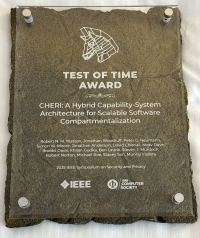Submitted by Rachel Gardner on Thu, 18/09/2025 - 00:00
Research by Department members was honoured by several leading conferences and organisations in August.
 The CHERI project
The CHERI project
There was an award in August for the researchers behind the CHERI ('Capability Hardware Enhanced RISC Instructions') technology. This pioneering cybersecurity technology focuses on new ways to design the architecture of a computer’s central processing unit – its brain – to make software less vulnerable to security breaches.
The researchers have been particularly interested in increasing memory safety since memory safety bugs in software are repeatedly exploited by hackers to cause major security issues. (Research from Google and Microsoft shows that 70% of ongoing cyber vulnerabilities are memory safety bugs.) The CHERI technology extends conventional architectures and software stacks with novel hardware support for memory protection and secure encapsulation.
In August, the Institute of Electrical and Electronics Engineers (IEEE) presented the 2024 Best Paper Award in Security and Privacy to researchers working on the CHERI project. They were recognised for their paper CHERI: Hardware-Enabled C/C++ Memory Protection at Scale.
This was the second major IEEE accolade this year for the CHERI researchers. They had also received a 10-year Test of Time Award at the IEEE Symposium on Security and Privacy in May. This was in recognition of the long-term success of their 2015 paper CHERI: A Hybrid Capability-System Architecture for Scalable Software Compartmentalization.
Affective Intelligence and Robotics
 Also in August, the IEEE International Conference on Robot and Human Interactive Communication honoured a paper on 'Robot-Led Vision Language Model Wellbeing Assessment of Children'. This work explores how robots powered by Vision Language Models could support the assessment of children's wellbeing, while also reflecting on the potential biases such systems might introduce. (See the pre-print here.)
Also in August, the IEEE International Conference on Robot and Human Interactive Communication honoured a paper on 'Robot-Led Vision Language Model Wellbeing Assessment of Children'. This work explores how robots powered by Vision Language Models could support the assessment of children's wellbeing, while also reflecting on the potential biases such systems might introduce. (See the pre-print here.)
It was a finalist for the Best Paper Award, and won the KROS Interdisciplinary Research Award in Social Human-Robot Interaction.
The paper was co-authored by researchers in Prof Hatice Gunes' Affective Intelligence and Robotics Lab along with their collaborators in the Cambridge University Department of Psychiatry.
Artificial Intelligence
There was also recognition for Prof Fermín Moscoso del Prado Martín, Associate Professor here of Computational Linguistics.
 Fermín formerly led the AI Team at Alpha (part of Spain's multinational telecomms company Telefónica) where he headed up research and development in affective AI, privacy-preserving AI and explainable AI. At the International Joint Conference on Artificial Intelligence, he and former colleagues from Alpha received the Artificial Intelligence Journal 2025 Prominent Paper Award.
Fermín formerly led the AI Team at Alpha (part of Spain's multinational telecomms company Telefónica) where he headed up research and development in affective AI, privacy-preserving AI and explainable AI. At the International Joint Conference on Artificial Intelligence, he and former colleagues from Alpha received the Artificial Intelligence Journal 2025 Prominent Paper Award.
It honoured their 2021 paper Using Ontologies to Enhance Human Understandability of Global Post-Hoc Explanations of Black-Box Models. This award recognises outstanding papers published within the previous seven years that are "exceptional in their significance and impact".
Best Artifact Award
 Eric Chun-Yu Peng and Markus Kuhn from the Security Research Group won the Best Artifact Award at the Cryptographic Hardware and Embedded Systems Conference 2025 conference in Kuala Lumpur in mid-September. Their paper – on Adaptive Template Attacks on the Kyber Binomial Sampler – demonstrates a new type of power-analysis side-channel eavesdropping risk that microcontroller implementations of the cryptographic key encapsulation mechanism ML-KEM/Kyber need to be protected against.
Eric Chun-Yu Peng and Markus Kuhn from the Security Research Group won the Best Artifact Award at the Cryptographic Hardware and Embedded Systems Conference 2025 conference in Kuala Lumpur in mid-September. Their paper – on Adaptive Template Attacks on the Kyber Binomial Sampler – demonstrates a new type of power-analysis side-channel eavesdropping risk that microcontroller implementations of the cryptographic key encapsulation mechanism ML-KEM/Kyber need to be protected against.
Kyber is the first of a new generation of public-key encryption standards especially hardened against the threat of being broken by future quantum computers. Along with their open-access paper in IACR Transactions on Cryptographic Hardware and Embedded Systems, Peng and Kuhn also published their experimental dataset, along with the Julia code needed for independent researchers to reproduce the results. The award was given for the high standard of reproducibility of their work.
Many congratulations to all our colleagues on their awards.

